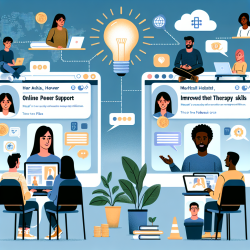Online peer-to-peer support (oPTPS) through platforms like Facebook has proven to be a valuable resource for mental health information and emotional support. The research article "Online peer to peer support: Qualitative analysis of UK and US open mental health Facebook groups" by Prescott, Rathbone, and Brown offers insights that can help practitioners enhance their skills. Here’s how you can apply the findings to your practice.
Benefits of Online Peer Support
According to the study, oPTPS can:
- Increase feelings of connectedness
- Reduce feelings of isolation
- Provide a platform for sharing personal experiences
- Offer hope and empowerment
These benefits highlight the importance of integrating peer support mechanisms into your therapy practice. Encouraging clients to participate in such groups can enhance their sense of community and reduce isolation.
Implementing Research Findings
Here are some actionable steps based on the research:
Encourage Participation in Online Groups
Clients can benefit from the emotional and informational support available in these groups. Direct them to reputable mental health Facebook groups where they can share experiences and receive support.
Monitor Group Dynamics
The study found that both UK and US groups face issues like misinformation and inappropriate comments. As a practitioner, you can guide your clients on how to navigate these challenges and identify trustworthy information.
Foster a Safe Environment
Group cohesion and a sense of safety are crucial. Encourage clients to join groups with active moderation to ensure a supportive and respectful environment.
Encourage Further Research
While the study provides valuable insights, there is always room for further research. Practitioners can contribute by observing their clients' experiences and sharing findings with the broader community.
Conclusion
Online peer support groups offer significant benefits for mental health. By encouraging participation and guiding clients on how to navigate these platforms, practitioners can enhance their therapy practice. To read the original research paper, please follow this link:
Online peer to peer support: Qualitative analysis of UK and US open mental health Facebook groups.
